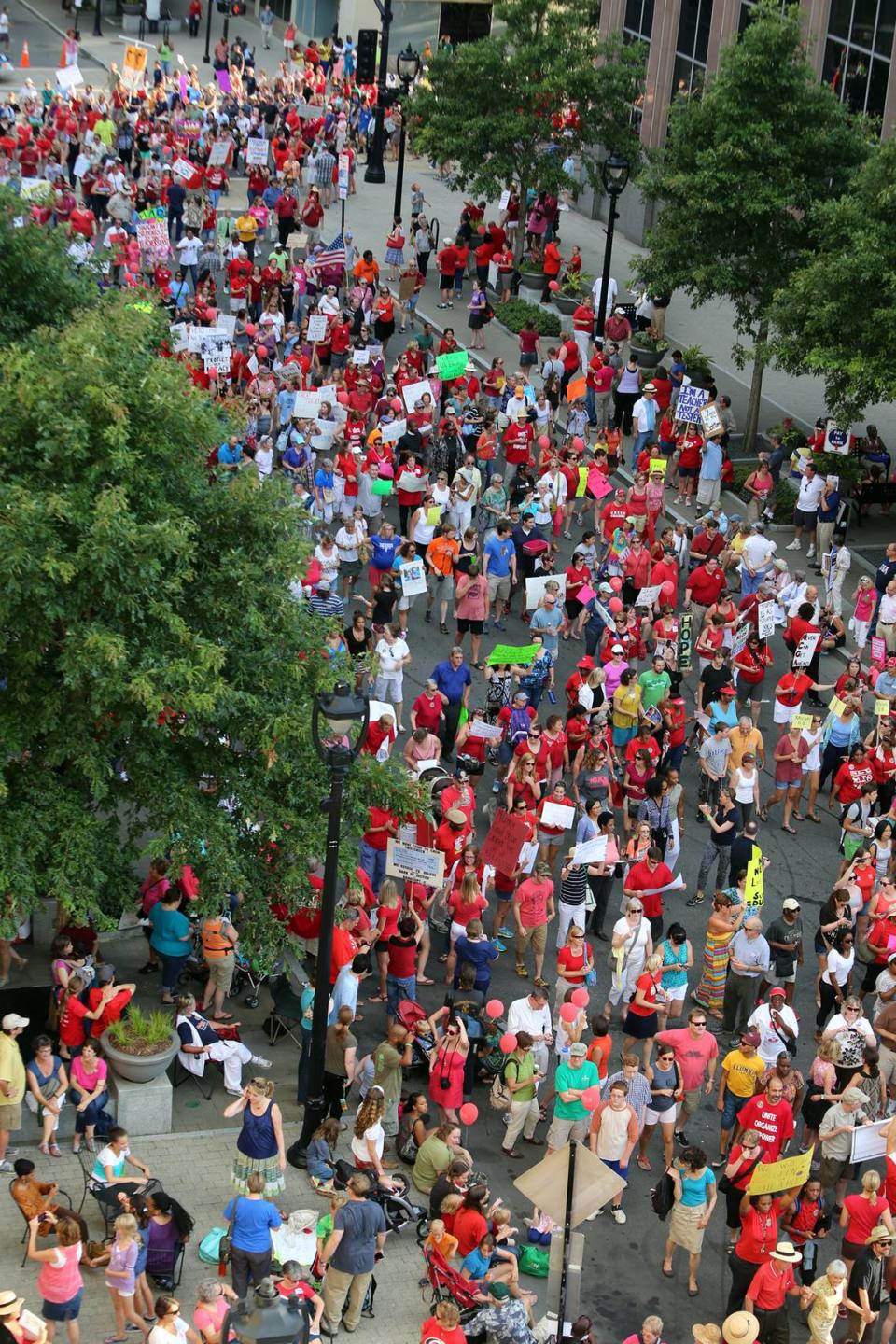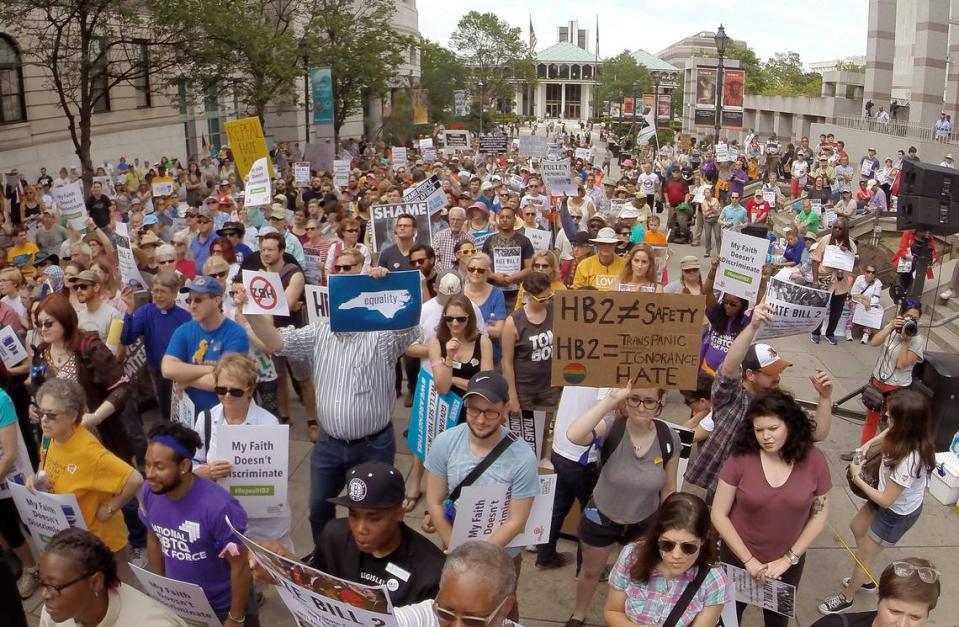Q&A: Rev. William Barber on ‘extreme and violent’ NC agenda, Moral Monday revival
Rev. Dr. William J. Barber is calling out legislators for what he says is an “extreme and violent agenda” as the Moral Monday movement he helped start passes its 10th anniversary and looks toward a revival.
Barber spoke Monday in conjunction with the Poor People’s Campaign at the Charlotte Mecklenburg Government Center for the “Wake the Sleeping Giant” event to share his concerns about the legislature’s priorities and aim to spark action ahead of upcoming elections.
In an interview with The Charlotte Observer ahead of Monday’s event, Barber called the legislature’s budget proposals “terrible,” saying they don’t “address the needs of public education” and “reroute more money from public education to private schools.” Top Republicans in the legislature have estimated a budget deal will likely be reached in mid-August after both bodies passed differing versions, the News and Observer reported.
Barber also critiqued legislators for not putting forth legislation to raise the minimum wage. While bills to raise the minimum wage have been filed during the 2023-24 legislative session, none have made it out of committee.
“Over 70% of North Carolinians want to raise the minimum wage,” he said. “So where’s the living wage bill?”
The Moral Monday movement, which rose to prominence in North Carolina in 2013 when Republicans held both legislative chambers and the governor’s mansion, previously gathered earlier this year at the N.C. State Capitol Building in Raleigh. More than 300 attended that event — years after thousands came out during the 2013 protests.
Barber said Monday he wants to reenergize low-income and working-class voters across the state and the political spectrum to vote in their own interests as the 2024 election cycle looms.
“The greatest fear to kick around in the South has always been for the masses of poor and low-income Black people, white people, brown people, Asian people, Latino people and indigenous people to come together and build a powerful voting bloc that could fundamentally reshape the economic architecture of the country,” he said. “That would be good for everybody.”
At Monday’s event, speakers from religious communities, the LGBT+ community and more shared concerns about issues including homelessness and discrimination against transgender people.
The following is more of a lightly edited interview with Barber about his thoughts on the 2024 elections, voting rights and more. Answers have been edited for length and clarity:
On the impact of the 2010s Moral Monday movement
Barber: This tonight is a Charlotte version of the Moral Mondays that launched in 2013, during a time when extremists in our legislature decided that they were going to block Medicaid expansion, block minimum wage increases, attack our immigrant brothers and sisters, attack the LGBTQI community and even go after voting rights.
We registered massive numbers of voters. We turned out voters in 2014 and 2016 that scholars and political scientists say were critical in sending an extremist in (former NC Gov. Pat) McCrory home from out of the governor’s office. North Carolina became one of the only southern states that did that.
And we won in court against the most massive voter suppression case since the Shelby decision. The extremists spent millions of dollars, but we put together a diverse team of lawyers and plaintiffs — not just Black plaintiffs but white and Black plaintiffs and clergy and young people — and the courts agreed with us that they had engaged in racism with surgical precision.
We also were able to prove that the persons who engage in extremism and voter suppression and attacking immigrants or attacking the gay community were also using those things as a cover up so that people would not see how they were also blocking the very things that people need in their everyday life, like living wages and health care.
On what’s next

Barber: This is one step toward the work that we’re going to be increasing around the state.
We’re gonna be engaging in major protests with impacted people speaking out about how this extremists legislature is hurting them in their daily lives. We’re gonna be what we call in the streets and in the voting booths, because what we know now is that in America
What we know is that this is critical — we have to mobilize among our poor and low income brothers and sisters.
On poverty in North Carolina
Barber: We have recently found out through national studies that poverty has become the fourth leading cause of death — higher than homicides, diabetes, obesity. (A University of California Riverside paper published in April associated poverty with 183,000 deaths in 2019 — the year just before the COVID-19 pandemic.)
And during COVID when we were investing in certain things, we saw poverty go down. Now that’s going back up because the extremists have said no to something like the Child Income Tax Credit that took 50 to 60% of children out of poverty during COVID. They said no to living wages that could lift up millions of people out of poverty.
And that’s why this is critical in North Carolina.
In North Carolina between 2018 and 2020, we had over 4.2 million poor and low income people. That’s 40% of the population. We know that in North Carolina, working at a minimum wage of $7.25, you have to work 106 hours a week to afford a modest life.
These are working people. And instead of the state legislature focusing on that, particularly those who are Republican and extremist, they are focusing on things that don’t matter. Over a million people need health care. Many of them have been formerly connected to the military. Legislators claim to love the military, and yet we still don’t have Medicaid expansion.
In North Carolina, 2 million households benefited from the Child Tax Credit; 600,000 low wage workers without children received the expanded Earned Income Tax Credit. And all these extremist Republicans are focused on is being against people being woke, banning books, suppressing the vote. What are they doing underneath that? Blocking tax credits, things that even Ronald Reagan supported.
So Moral Mondays says some things aren’t about left vs. right and Democrat vs. Republican, they’re about right vs. wrong.

On voting rights, recent SCOTUS rulings
Barber: What we hear coming on voter suppression is just a regurgitation, a vomiting of what we’ve already beat them on time and time again. You know, they tried to go to the U.S. Supreme Court with the Moore v. Harper case (where the Supreme Court rejected the argument that state courts have no say over state lawmakers) to get legislative sovereignty. Even this Supreme Court said you must be out of your legal mind to think that we’re gonna allow a bill that says that if the legislature passes something, they have complete authority and autonomy with no oversight from the court.
But all of this extremism is ridiculous when you think about what they have done.
The gun bills, they passed that (Senate Bill 41, a that law immediately repealed pistol purchase permit requirements, took effect in March). They’ve been, you know, crying out against affirmative action, well they finally got that.
On the 2024 election cycle
Barber: The campaign focuses on the state legislature, so we’re challenging the state legislator extremists who get elected from here and when they go to Raleigh, they vote against people in Charlotte who need health care. The majority of which by the way are white, and women and working.
My focus in the campaign is the state legislators and the congressional delegation and looking at their records in relationship to how their policies impact, negatively or positively, poor and low wealth people, who make up over 40% of the electorate (The U.S. Census Bureau estimates 13.4% of North Carolinians live in poverty). Think about that — poor and low-income people make up over 40% of the electorate.
When was the last time that we’ve had a debate with people running for the Senate or running for governor and they had to take an hour to discuss, “If I get elected, this is what I’m going to do to help alleviate the pain, the death?”
We have to have this huge debate and discussion and dialogue in the public square in our political debate, otherwise what we have is an impoverished democracy.

